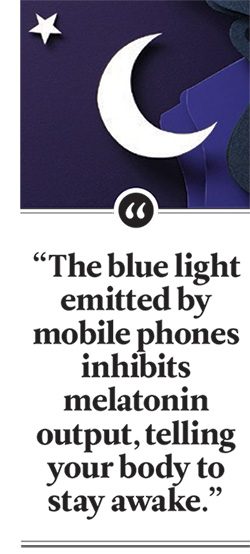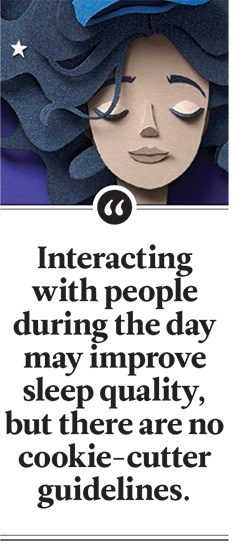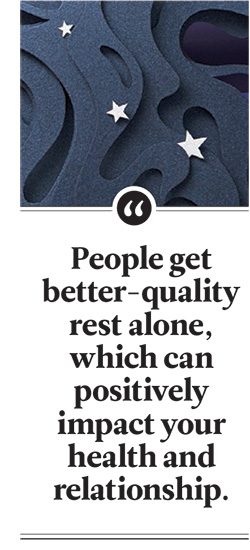7 Surprising Ways to Get More Sleep
Think outside the box to reclaim your nighttime rest

An insomniac friend unwittingly hijacked my sleep recently. I’d never had trouble staying asleep before, but my friend started texting at 2 a.m. to pass the time. I keep my mobile phone on my nightstand, so his texts disturbed me, even with the phone on vibrate—the buzz, accompanied by a lit screen, jolted me awake. Eventually, I activated a do-not-disturb setting: My phone remained blissfully silent and dark when I received unwanted texts between 11 p.m. and 8 a.m., and my sleep returned to normal.
Mobile phone alerts, bathroom trips or other causes spoil many people’s nightly rest. International guidelines suggest that adults should sleep between seven and nine hours nightly, but a survey of six countries,* including Germany and the United Kingdom, shows that about 40 percent of us don’t get enough rest.
Chronic sleep deprivation isn’t just making us groggy; it can harm our health: Research shows that adults who don’t sleep enough are more likely to be sedentary and obese, and they’re at greater risk of diabetes, heart disease, depression and common illnesses like colds.
“Sleep is so important to physical and mental health,” says Neil Stanley, a sleep researcher in Farnborough, England. “Anything that causes poor sleep on an every-night basis can have associations with risk factors for diabetes, obesity, depression and other problems. You have to look at things that you potentially can do to improve the situation.”
Fortunately, you don’t have to swear off coffee, rely on sleeping pills or buy a fancy mattress to get a good night’s rest. These offbeat tips may help improve the quality of your slumber:
Ditch your smartphone
Studies show that up to 60 percent of adults keep their mobile phones in the bedroom at night. You’re more likely to stay up too late texting, e-mailing or using social media, then feel drowsy the next day.
“We know from research that using one app leads to another, so you are likely to spend more time on your mobile phone than you have intended to,” says Liese Exelmans, a researcher at the School for Mass Communication Research at the University of Leuven, Belgium. “People over 60 who use their mobile phones at night have a shorter sleep duration.” Older people are more likely to be morning persons, with a biological tendency to wake up earlier, or they may need to rise early for work or other activities.
Sleep experts recommend against bringing phones into the bedroom, but this is unrealistic for adults who use their phones as alarm clocks and who want to feel connected to friends through their devices. “Many people have a feeling that they are disconnected from the real world if their phone is not in the bedroom,” Exelmans says. “It triggers hypervigilance. You are not completely at rest, because you expect to be contacted sometime during the night. It’s the fear of missing out.”
Donny Soh, 38, of Singapore, experienced this phenomenon first-hand. When his company launched a new product last year, he’d wake up at all hours to see if anyone had placed online orders. “I would wake up perhaps three to four times per night,” says Soh, who admits that an attitude change helped him reclaim his slumber. “Regardless of how awake I am or how often I check my phone, it doesn’t really affect the sales, and since this realization, sleep got much better.”
The blue light that smartphones emit can also negatively impact sleep. Blue light mimics daylight, so the body is discouraged from producing sleep-inducing melatonin at bedtime, which promotes drowsiness. “The blue light emitted by mobile phones inhibits melatonin output, telling your body to stay awake,” Exelmans says. Adding an app with a blue-light filter can help.

If you’re unwilling to part with your mobile phone overnight, minimize interruptions and encourage sleep by activating nighttime blackout periods, so that no calls, texts, e-mails or notifications go through.
“Keep it on flight mode, dim your screen and place it on silent mode,” Exelmans says. “Or remove some apps: Facebook, work e-mail—it discourages you from spending time on it.”
Computers and televisions emit the same blue light that smartphones do. Best to keep computers and TVs out of the bedroom, and turn them off one to two hours before bedtime. And if you wake up in the middle of the night, refrain from turning to a screen. Says Exelmans, “Read a book, not a tablet.”
Put your feet up
Is your nighttime slumber interrupted by urgent bathroom visits? You may have a little-known condition called nocturia, which awakens people from a sound sleep two or more times per night with the strong urge to urinate. As many as three out of five older adults suffer from nocturia, which negatively impacts sleep.
“Even in people who fell asleep easily again,” says Dr. Philip E.V. Van Kerrebroeck, professor of urology at Maastricht University in the Netherlands, “the interruption of sleep disrupts the normal sleep patterns and can have general health consequences: high blood pressure, diabetes. And it can have an impact on the cognitive function.”
Nocturia isn’t a disease; rather, it’s a symptom of conditions like sleep apnea, male prostate problems and lower estrogen levels in women. Many people assume that it’s a normal part of aging.
“With aging, there are problems that install themselves, but the night is to sleep and not to pee,” Van Kerrebroeck says. “Sleep is a protective mechanism. An elderly individual has the right to a healthy life.”
Lifestyle changes may help: Drinking no more than two liters of liquid daily, curtailing in the evenings; avoiding caffeine and alcohol for six hours before bedtime; taking diuretics in the morning or early afternoon, rather than later in the day; and elevating your legs.
When you put your feet up before bedtime, it pushes the fluids that have accumulated around your ankles back into the bloodstream, allowing you to urinate out the excess fluid while you’re awake. If you don’t elevate your legs until you slip into bed, the excess fluid becomes urine while you sleep, leading to nighttime awakenings. How long you’ll need to sit with your feet up depends upon your personal health.
“With varicose veins or edema, it may take longer for the fluids to return,” Van Kerrebroeck says. “There’s no problem to do it for two hours. For many people, half an hour might be too limited.”
Many people can improve nocturia with lifestyle changes, but for those who cannot, research has shown that the drug desmopressin can cut the number of nightly bathroom visits in half for 30-40 percent of older adults, significantly improving sleep quality.

Do the Downward Dog
A recent study from the University of Washington found that older women who took yoga for two months reported considerably less insomnia. The gentle motions and poses may help reduce stress levels and improve blood flow, which makes it easier to sleep.
“Look for the kind of yoga in which the breath is really involved,” says Versailles-based yoga teacher Laurence Maman, a member of the teachers’ trainers’ college of the Institut Francais de Yoga, affiliated with the European Union of Yoga. “By using exhalations rather than inhalations, you can influence the relaxation effect.”
The relaxation response or effect has been shown to lower blood-pressure levels, reduce stress and encourage sleepiness. Maman recommends practicing yoga for 15 or 20 minutes before bedtime, choosing a lying-down position that emphasizes relaxed breathing. “It can rather quickly have an effect on sleep quality.”
When New Jersey resident Jodi O’Donnell-Ames turned 50 this year, she started awakening at 3 a.m. nightly, unable to fall back asleep. The longtime yoga practitioner turned to yoga for help.
“I used to practice power yoga more for cardio than for relaxation,” O’Donnell-Ames says. “I added gentle yoga flow to my weekly routine. It took two weeks to see a consistent difference.”
Grab dinner with friends
Whether you have an emotionally fulfilling day may influence the soundness of your sleep. Researchers at the University of Chicago found that many people who are unable to sleep through the night feel isolated from family and friends. These lonely people take longer to fall asleep at bedtime, and they’re more likely to toss and turn in the middle of the night, sleep for fewer hours and experience daytime grogginess more often than emotionally connected people.
Older adults are particularly susceptible to emotional loneliness. “Later life contains events such as retirement, children leaving home, and potentially bereavement and widowhood,” says psychologist and researcher Joanna McHugh of Trinity College Dublin. “All of these events may create loneliness.”
Interacting with people meaningfully during the day may help to improve sleep quality, although there are no cookie-cutter guidelines. “The link between loneliness and sleep quality is still relatively new and under-researched, so it is hard to make recommendations,” McHugh says.
Seeing friends may make you feel more emotionally connected, but you may not be able to socialize as often as you’d like. Some research suggests that chatting with friends by phone may provide ample emotional support, but texting and social media won’t cut it. Counseling may be necessary for some. “One can feel lonely despite being highly socially connected,” McHugh says. “It cannot be resolved purely by social contact.”
Try another bed
Falling asleep next to a snoring partner can be frustrating and tiring. Research shows that half of nighttime sleep disturbances are caused by disruptive bedmates. This can translate to chronic sleep deprivation, depression, heart disease and relationship problems. “People who have poor sleep actually have a higher rate of divorce,” Stanley says. “The next day, you’ll have more arguments, be less likely to make up and have a lack of empathy toward that person. It’s a potential recipe toward marital disharmony.”
A simple fix: Sleep in separate bedrooms. Researchers have confirmed that people get better-quality rest alone, which can positively impact your health and your relationship. “Sleep is the most selfish thing that you can do,” Stanley says. “If you’re sleeping alone, you’re not going to have somebody snoring, kicking, getting up to go to the bathroom or just turning over.”
About one-third of married couples sleep in separate rooms, according to Toronto researchers. This trend has been slowly gaining momentum for a decade. “Talking about sleeping separately is probably one of the biggest taboos,” Stanley says. “Other people say if you’re in a relationship, you must share a bed or you’re calling into question your relationship. That’s complete and utter nonsense.”
Want to try separate rooms? Broach the subject in a loving, non-judgmental way when it isn’t bedtime.
“It really is about saying that sleeping separately isn’t a withdrawal of the self, that you’ll kiss and cuddle and when you say goodnight, rather than turning to the other side of the bed, you’ll go to the other room,” Stanley says. “People get sent to the back room or the couch as if it’s a punishment. But you say, ‘I want a good night’s sleep, so I’m going to sleep in the back room, but it’s going to be my room. It’s not going to be a punishment.’ If you do it in a loving way and you remain intimate, it works.”
Watch what you ingest
What you eat and drink in the evening can affect your sleep quality. A heavy meal right before bedtime can cause stomach acid to rise into your esophagus, which we know as heartburn, especially if you consume spicy foods, tomato-based products or chocolate. The burning, painful symptoms of heartburn may keep you from falling asleep or may wake you.
Chronic heartburn may be a sign of gastroesophegeal reflux disease (GERD), which can cause serious problems over time. Lying down after eating may exacerbate GERD. Says gastroenterologist Dr. Gary Falk, a professor of medicine at the Hospital of the University of Pennsylvania. “With lying down and going to sleep, one loses the defenses of gravity, saliva and swallowing.”
To minimize reflux, stop eating two to three hours before bedtime. To keep gravity working in your favor, elevate the head of your bed, says Dr. Joseph Ojile, medical director of the Missouri-based Clayton Sleep Institute.
Alcohol can also cause reflux, but there are other reasons to avoid drinking late in the evening. Alcohol is a diuretic, which means that you’ll have to pee soon after imbibing. And some drinks are worse than others. “Beer has an effect of stimulating the urine production,” Van Kerrebroeck says.

Chill out
People sleep best when the bedroom is about 65 degrees Fahrenheit (18 degrees Celsius), according to research. Your temperature naturally drops as bedtime approaches, so keeping your bedroom cool helps your body adjust itself more efficiently.
“Warmth is a signal to the brain to stay awake for many people, says Ojile. “Throughout the night when it’s hot, you have this constant stimulation, which is wake-promoting. And there’s a tactile issue, too—some people have trouble sleeping if there are no sheets or comforters on them.”
Try keeping your thermostat at a cool temperature year-round. If your partner likes it warmer than you do, consider products that can keep you cooler than your bedmate, such as a gel pillow cover or a temperature-controlled heating-cooling pad that fits over only your half of the bed.



